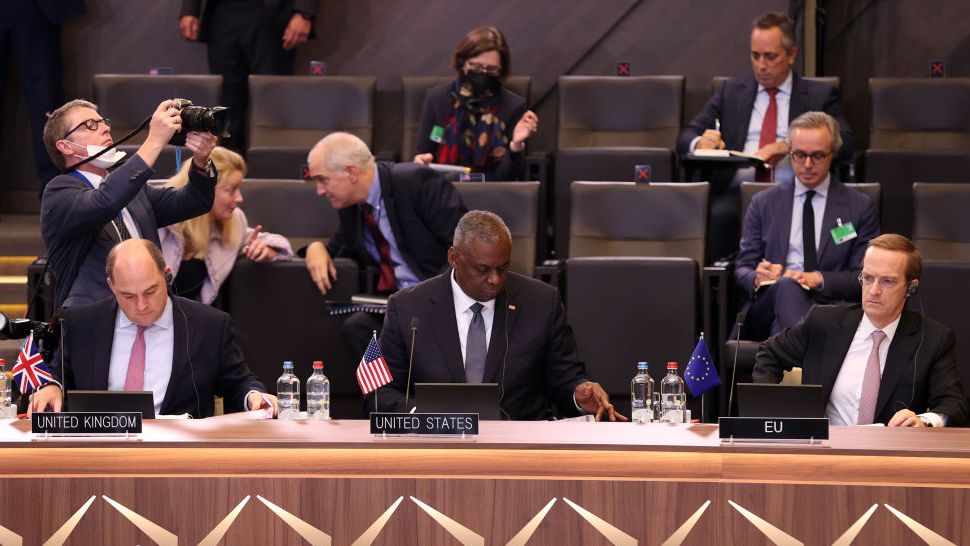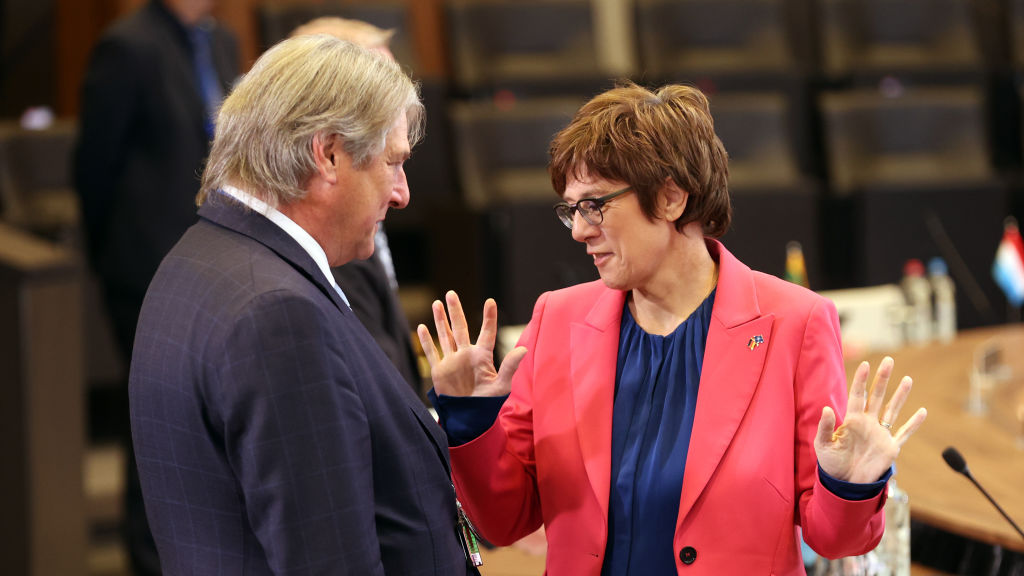
U.S. Defense Secretary Lloyd Austin (center front) attends the second day session of the NATO Defense Ministers meeting in Brussels, Belgium, October 21, 2021. /Getty
U.S. Defense Secretary Lloyd Austin (center front) attends the second day session of the NATO Defense Ministers meeting in Brussels, Belgium, October 21, 2021. /Getty
Editor's note: Bradley Blankenship is a Prague-based American journalist, political analyst and freelance reporter. The article reflects the author's opinions and not necessarily the views of CGTN.
U.S. Defense Secretary Lloyd Austin wrapped up a two-day meeting of NATO's defense ministers on October 22, the first in-person meeting of its kind since the beginning of the ongoing COVID-19 pandemic, without any clear indication of the alliance's future aims despite its existential crisis following the disastrous withdrawal from Afghanistan.
All eyes are on the next major summit in Madrid next year that will see NATO formulate its first "strategic concept" document since 2010, surely to include major changes for what exactly the organization, a relic of the 20th century Cold War between the U.S. and Soviet Union, exists for in the first place.
The U.S. is making it extremely clear that NATO should reformulate its strategy to combat the rise of China, essentially turning the clock back some three decades.
One of the three main takeaways from the defense ministers' meeting, according to the U.S. mission to NATO's Twitter page, is that "partnerships with countries around the world strengthen the Transatlantic community." This is obviously a call-out to China and a sign that the U.S. wants NATO to potentially entrench itself in the Asia-Pacific region.
Plus, an agreement struck by the alliance on AI, which is a highly publicized point of concern among U.S. defense analysts with regards to China, was described by NATO Secretary-General Jens Stoltenberg as "relevant to the challenges posed by the rise of China."
Even so, nothing explicitly mentioning China has been disclosed at this time; none of the ministerial sessions from this latest event even focused on China and NATO's current strategic concept dating back to 2010 doesn't even mention the country.
From the European side, the bloc's posture will depend greatly on the "Strategic Compass" that EU foreign policy chief Josep Borrell is currently drafting. This document should be presented in November, debated further by leaders in December, with a target approval of March of next year, just a few months ahead of the 2022 NATO summit in Madrid.

German Defense Minister Annegret Kramp-Karrenbauer (right) attends the second day session of the NATO Defense Ministers meeting in Brussels, Belgium, October 21, 2021. /Getty
German Defense Minister Annegret Kramp-Karrenbauer (right) attends the second day session of the NATO Defense Ministers meeting in Brussels, Belgium, October 21, 2021. /Getty
This compass will undoubtedly set the marker for where the EU will position itself on rising tensions between China and the United States. As Borell was quoted as saying after a recent European Council dinner in Slovenia, "We are very much aware that the world is having a shift on the geopolitical balance of power."
While it's difficult to speculate at this juncture, the EU has collectively been very cautious about taking sides so far in other forums. For example, the U.S. has been trying to hijack the latest bilateral U.S.-EU Trade and Technology Council (TTC) meeting and working groups centered mainly on short-term issues related to the global semiconductor shortage, export controls and investment screening.
The latest statement that came from a high-level meeting of this forum suggests that the EU resisted an overly hostile stance against China since it didn't even mention China by name.
In fact, the announcement from this latest meeting of NATO defense ministers that the U.S. publicly supports a European defense, led by France, complementary to NATO is perhaps the greatest indication of how complicated transatlantic relations have become.
Officials are painting this as a win for both sides, but it is definitely a concession from Washington that would have been unthinkable less than a decade ago. After the tumultuous years of former President Donald Trump, the failed withdrawal from Afghanistan and the deceitful AUKUS security pact, relations between the U.S. and Europe are the weakest they've ever been.
The EU recognizes that it should look out for its own interests independent of Washington. That's because U.S. foreign policy continues to hurt Europe's interests despite the fact that Trump is no longer president, plus there's a high chance that he, or someone worse, could win again in 2024.
This shows a serious crisis for NATO because 21 EU member states make up the 30-strong NATO security alliance. This is not to say that the EU is going to abandon NATO in favor of a common European structure, certainly no doubt because many countries would object, but it does show that NATO is becoming less relevant to the countries it was initially created for in the first place.
(If you want to contribute and have specific expertise, please contact us at opinions@cgtn.com.)

